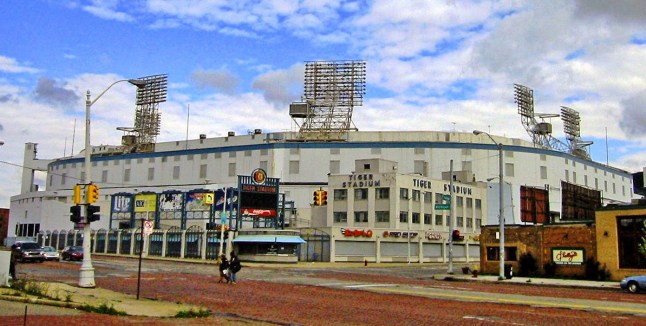by: Jack C. Buck
Two offerings of flash-fiction that whisk us back to days of yore…
War Time
My dad’s favorite time of the year is in the summer, when it’s not too humid, and the Detroit Tigers aren’t losing. You gotta get him before it gets too hot, before he is forced to “fork-over” his money by turning on the AC. When this all comes together, my father is content with the world around him. It’s usually some time between early June and early July when he tells me about that one time all over again, when he was fourteen years old and he and his brother, my uncle Henry, took a bus down to Detroit on the weekend of July 23rd, 1967.
It was a weekend getaway, which they often took from Kalamazoo to Detroit. It was a good way for them to learn how to get around and manage what little money they had. The Greyhound would drop them off for one dollar and twenty five cents at the corner of 12th and Clairmount on the city’s west side. They would stay for free at the YMCA across the street and walk the half mile to the stadium. Joe, my father, and Henry were to be in the city just for the Tigers weekend series versus New York. This was before all the expansion teams, when no team was awarded a playoff spot unless you won damn near one hundred games. It was a difficult time in baseball for the majority of teams’ fans. The boys were excited though, through ninety-three games Detroit was in the race for the pennant. The Yankees at the time were long dead at fourteen games back. Detroit was likely to win the weekend series so everyone in the city was sure to be in a good mood.
What the boys looked forward to most of all was walking around the city at night after the game. My dad told me it felt like all of Detroit was outside. My uncle Henry would laugh and moan, stumbling down the streets pretending he was a pitcher who had blown out his arm by throwing one hundred and eighty nine pitches. Sometimes it would garner some attention by way of the occasional person asking him if he needed help.
Come late evening, 12th street was a center for Detroit nightlife, with the city’s inhabitants reluctant to call it a night by going home. It was the 1960’s and people didn’t want to go off to Vietnam. With brothers, friends, and old classmates trying to stay alive in southeast Asia, going home when the bar was supposed to close by city regulations meant possibly hearing bad news or not seeing that one guy at the end of the bar ever again because he may get his slip to report the next day. So, they hung out, held on, and bought some time by telling or listening to another story.
Being teenage boys with a father who had served in the nation’s previous war, Henry and my dad read history books about World War II and reenacted killing Nazi’s with the neighborhood boys by way of splitting up into Good Guys and Bad Guys. The boys didn’t play “Vietnam War” though. One of the neighborhood boys, Peter Clausin’s older brother, had been drafted and died in that same year of 1967. It was unspokenly agreed upon that Peter was the top ranked officer for the Good Guys. And, boy, did he kill a lot of bad Nazis that summer. He turned into a killing machine. He would march the other boys who had a quarter of German blood out to the field behind the unused tennis court, and make them keep their eyes open while he shot them in the head with a wooden rifle bought from the corner drugstore. Pretend-killed or not, the boys liked the reenactment. It was a way for them to act brave for an afternoon’s time when in truth they were all just young and scared.
In the late hours of Saturday night, early Sunday morning, around 3 a.m on July 24th, Detroit police officers raided the weekend drinking club at 9125 12th Street arresting eighty-two black patrons who were celebrating the return of two local GI’s. By midmorning, every policeman and fireman in Detroit was called to duty, and President Johnson was soon to call in the Federal troops. Jason Jones, fifteen years of age, in the midst of the riots, was sitting under a tree when he was shot in the chest.
The city deemed it unsafe for the Tigers to play their home game the following Sunday afternoon, so the powers that be moved the game to their opponents home field, leaving behind the players’ wives and kids in a city filled with unrest. There were a lot of people down there carrying guns, my dad said. He said he saw a lot of cops with guns, but he never saw any fellow citizens holding any. My dad had never seen an actual gun being fired off before, until then. He stopped playing pretend war in the neighborhood after that.
A Brief History of the Great Lakes Region in the 1990’s
Dad went to work each day. He sold life insurance policies to farmers. Mom always woke up with us at 5:30 am to make us breakfast. By that time, two years in, my paper route had lost its excitement; however, dad would plead for us at the dinner table to keep with it. We had to wear uniforms at school, blue pants, tucked in oxford shirts. You could wear turtlenecks, but rarely anyone ever did. During college football season, on Fridays at school, we were allowed to wear our Notre Dame sweatshirts. In our young world, there were no other colleges. Dad would convince me to not quit the paper route by saying, “Don’t you want to save up your money so you can go to school in South Bend?”
It was expected that we would deliver the five blocks of newspapers by 7:30 am, otherwise old men who liked to read the paper first thing would make a point to be waiting for us out front with a cast-iron snow shovel. Mom believed in the respect of punctuality, so in those last few months of my paper route she would drive us around in the 1992 Chrysler Town and Country Van, mom robed in dad’s long, gray winter jacket with the red plaid inner-lining, while I ran through the neighborhood to and from the van winging rolled up newspapers onto porches. We really made good time when mom finally bought in. The system involved having the side door wide open while she drove at a consistent speed of five miles per hour. It saved me time on opening and closing the heavy door. We really had a good thing going.
Then, over dinner one evening, mom told us we were going to have an addition to the family. The paper route was now going to be solely up to me. Mom wouldn’t be driving me around with new brother George on the way. I had grown to like the van-delivery system mom and I had created. I was able to warm up in the car a bit in between blocks.
It was right before our school’s winter break when I quit delivering the newspaper. At first I just stopped delivering to a block or two here and there, telling anyone if they complained that perhaps a stranger was ripping off the their papers. Blaming the undelivered papers on the evening’s snowfall bought me time as well. Eventually in the last weeks of the job, I managed to find enough sewer grates to shove the papers down.
It was the coldest winter in a decade, Notre Dame had lost in the Fiesta bowl to Ohio State, and Jenny O’Brien had switched schools. I saw no point in anything anymore. Jenny was what made sense for Catholic schools to be all boys or all girls. Boys like us had no business being around three hundred girls in hiked up socks wearing wool skirts. I don’t think us boys who were lucky enough to have our assigned seats within a seat or two of the young girls remembered a single concept taught that semester. There was something about the class location being across the courtyard, the half-lit basement storage room turned carpeted classroom that added to the excitement of it all. None of us were ever late or absent for that class with Jenny. When she was, we all died a little inside, wildly contemplating that the worst has happened; that Jenny switched schools. It was all her father’s fault, we figured, probably took a management job and the family now had to move up to Milwaukee. Us boys wanted to hunt down Jenny’s father, we wanted to tell him a thing or two.
Jack C. Buck, originally from Michigan, lives and teaches in Denver, Colorado. He is the Fiction editor for The Harpoon Review.






